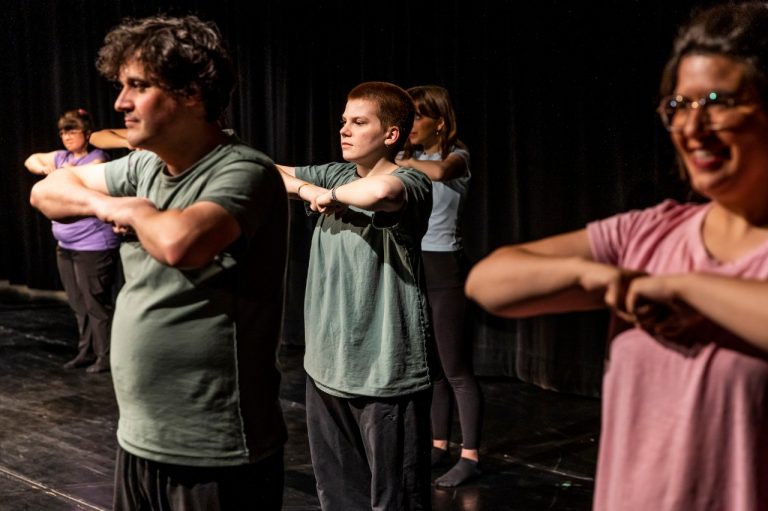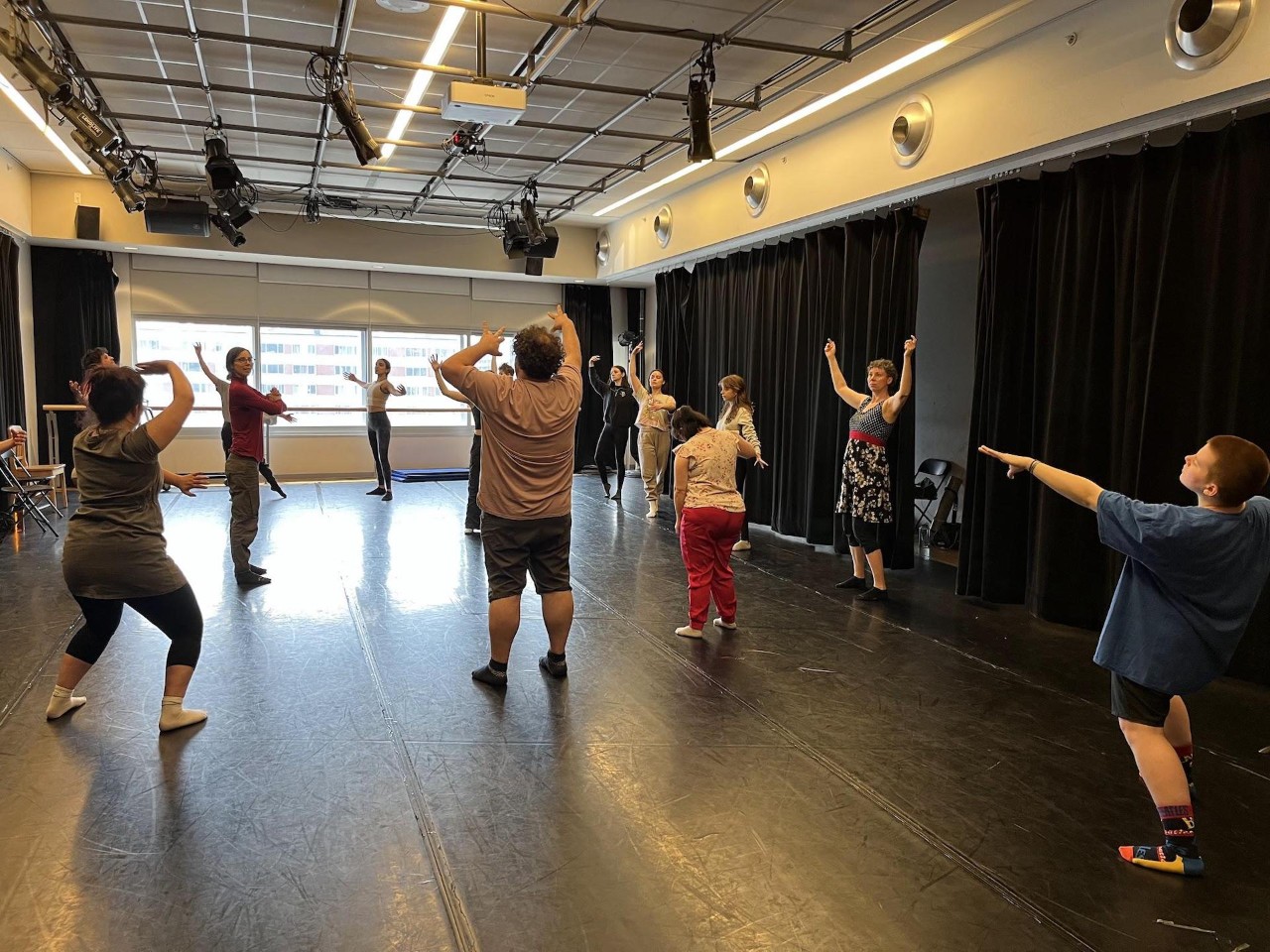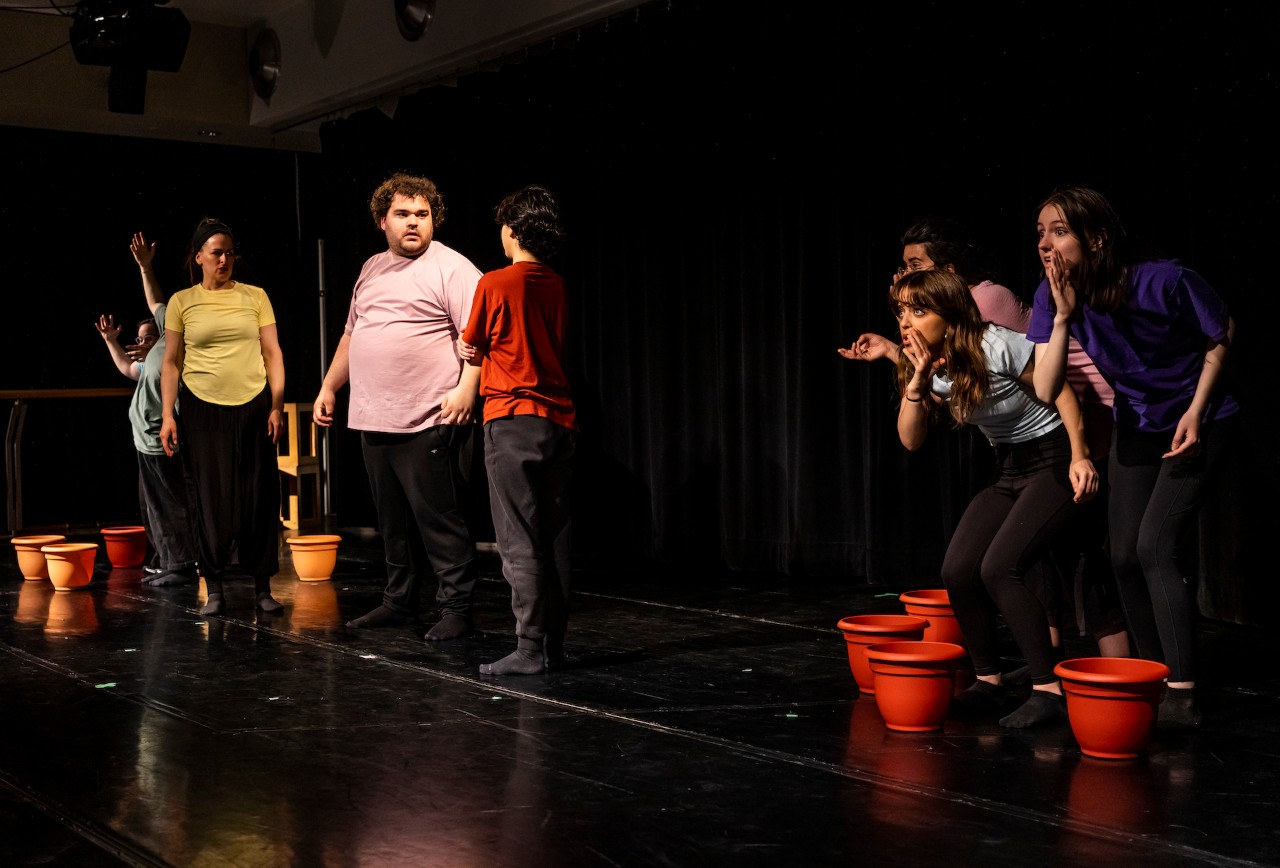A first-of-its-kind pilot project in Concordia’s Department of Theatre places inclusion centre stage

An innovative pilot project in Concordia’s Department of Theatre is shining a spotlight on inclusion and accessibility in the arts.
As part of the initiative, five professional artists with cognitive disabilities from Les Productions des pieds des mains joined a three-week intensive performance course alongside students in the department’s Acting for the Theatre specialization program. Menka Nagrani, a long-time advocate for disabled artists and Concordia assistant professor of theatre, leads the project.
Together, the students created, wrote and rehearsed First Name Basis, an original performance exploring how given names are used and the stories behind them. It included texts by Romanian-French playwright Eugène Ionesco, original texts and some singing and dance. It was performed in-studio before invited guests on May 30.
“I’m grateful to the theatre department for welcoming this important project,” says Nagrani, who founded Les Productions des pieds des mains, one of Canada’s first inclusive performance companies, in 2004.
“I hope it will inspire and lead to more inclusion, a key to social change.”
Leading up to the performance course, in fall 2022 Nagrani introduced the project to first-year theatre students. During the winter 2023 term, two students with disabilities participated and received credit for the theatre course Poetry and the Dancing Body (ACTT 398).
The theatre professor says the project is the first of its kind in Canada. She hopes it will highlight the key role universities can play in advancing inclusion in society.
 Roselyne Chevrette: “This has been an artistic dream for me for many years.”
Roselyne Chevrette: “This has been an artistic dream for me for many years.”
Learning from each other
According to Nagrani, the performance course offered a mutually beneficial learning opportunity.
“The artists from the theatre company already have significant professional experience,” she says. “They shared their concrete experiences working in television and theatre productions with Concordia students.”
Nagrani adds that the professional artists inspired their new classmates to go all in when acting.
“Neurodivergent artists are often very assertive in their acting, abandoning themselves completely to emotion and engaging 100 per cent in the moment without self-censorship, fear or judgment.”
‘You could see everyone’s light in the piece’
Third-year theatre student Claire Joly points out that the course wasn’t an integration but a collaboration from the start.
“We all pitched in, and at the end, you could see everyone’s light in the piece. Everyone really shined,” she says.
“This experience emphasized the importance of empathy in theatre because everyone has different needs, and it’s so important to take care of each other.”
Joly says she learned a lot from the neurodivergent artists and, in the future, will make sure the projects she’s involved with include diversity on all levels.
 Menka Nagrani: “I’m grateful to the theatre department for welcoming this important project.”
Menka Nagrani: “I’m grateful to the theatre department for welcoming this important project.”
‘I hope there will be other projects like this one for me’
For the artists from Les Productions des pieds des mains, this was their first time cultivating their craft in a university environment and receiving course credits.
Roselyne Chevrette, who lives in Quebec City, rented a place with her sister and support artist Anne-Hélène in order to participate. She says the course was an extraordinary experience.
“I learned a lot in those three weeks — new techniques for memorizing texts, that my body and movements speak without speaking, and that I can be expressive with simple words,” Chevrette says.
“This has been an artistic dream for me for many years. Now, that dream has become a reality. I hope there will be other projects like this one for me.”
‘We all need assistance in some way’
Kim Sawchuk, professor in Concordia’s Department of Communication Studies, is leading the project’s accompanying research. She’s working with research assistant and PhD student Alexandre Prince to assess the impact of this type of inclusive pedagogy on the student experience.
“The research question is, how can introducing an inclusive environment in a university system benefit all students?” Sawchuk says. “How can it allow them to flourish and, at the same time, learn and push themselves beyond what they thought they could do?”
Within this system, Sawchuk explains, they’re looking to pinpoint what specifically makes a class work or not. She notes that Concordia’s Access Centre for Students with Disabilities helped the neurodivergent students with some academic elements and that it was essential that supporting artists were in place to assist.
“There’s a myth in our society that we can be functioning, autonomous people, but we all need assistance in some way,” she adds.
Nagrani, who has championed artistic inclusion throughout her career and was appointed a member of the Order of Canada in 2020 for her work in this domain, says she would like to see the project open the door to future initiatives.
“Looking forward, I hope this project demonstrates that inclusion in a university theatre program is not only possible but offers countless benefits for everyone involved.”
Find out more about Concordia’s Department of Theatre.
Read the La Presse article on this innovative inclusion performance project.


